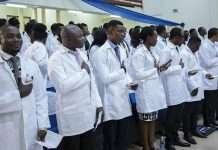
A non-profit organisation, eHealth Africa, has called for full installation and acceptance of solar energy system in public and private healthcare facilities to improve healthcare delivery in the country.
The project manager, eHealth Africa, Mr Mohammed Bello, made call during the organisation’s session at the ongoing Nigeria Energy Exhibition and Conference on Thursday in Lagos.
The News Agency of Nigeria (NAN) reports that the session was on the topic: “Sustainable Energy for Improved Healthcare Delivery in Nigeria”.
Bello said that the epileptic nature of energy/power supply in the country was a setback and major challenge obstructing operations of the nation’s health system.
He identified solar energy system as the solution to the situation and the reliable source of sustainable energy supply needed for the effective operations of the health sector.
According to him, eHealth Africa is working with the health Institutions, Federal Government and stakeholders in the health sector to ensure health facilities across the country have access to reliable power supply of the solar energy system.
He added that organisation was working with the energy sector and integration consulting firms, which were critical players on issues concerning energy.
“Energy supply plays a vital role in the operations of the health facilities; it boosts efficiency of service delivery, enhances performance and ensures accountability.
“There is virtually no medical operation that doesn’t require light/power supply. So, the motive is to ensure that every health facility whether in the rural or urban areas have access to reliable energy supply for enhanced health service delivery.
He said, “Presently, we have gotten the data of some of the health facilities that need the renewable energy systems/solutions.
“So far, we have collected the data of three states in the country namely Osun state, Kano and Nasarawa state.
“And as soon as we are done with the data collection.
“The next line of action will be to carry out an energy audit of the health facilities to know their energy profile and the total energy capacity they needed, so as to be able to deploy the appropriate energy supply.
“Once we are done with that, the next step will be to start deploying/installing the solar energy system for the health facilities; and they will begin to have 24 hours uninterrupted power supply for their operations”.
Speaking, the Executive Director, eHealth Africa, Mrs Juliet Odogwu, identified funding and maintenance as key to management and effective performance of the solar energy systems.
Odogwu said that funding for deployment and adequate maintainance of the solar systems/solutions had been a great challenge.
She noted that eHealth Africa have worked with countries like Gambia, Uganda and some other African countries, where they have deployed the solar energy systems; which were effectively functioning at present.
According to her, there is need for the governments and donor agencies to make funding available for the deployment of the solar energy solutions to address the bedevilling epileptic power supply situation in the health sector.
“For our sustainability plan; we have selected some staff of the identified health facilities who will work with our team to how to manage and maintain the solar energy systems.
“Another thing is that solar energy solution is a long lasting solution, it takes a lot of years before it can develop faults, and the sun is there to renew the energy.
“So, we are ready to deploy the solar energy solutions to Nigeria and all parts of African once we get the needed support and funding,” Odogwu said.
The country manager, WeCare Solar, Dr Julie Yemi-Jonathan, decried the rate of medical emergency casualties and child mortality in Nigeria, which she attributed some of the causative factors to lack of reliable energy supply.
Yemi-Jonathan said that many mothers and babies had lost their lives due to lack of power supply and adequate facilities in the nation’s health system.
“A lot of our health facilities do not have access to reliable power supply. We have seen cases where surgeries are turned down due to lack of power.
“There are instances where surgical operations are suddenly interrupted, leading to death of the patient in some cases due to power failure.
“To effectively handle medical emergency situations and avert infant mortality particularly during child birth, there is need for reliable power supply at all times in the health facilities,” she said. (NAN) (www.nannews.ng)













